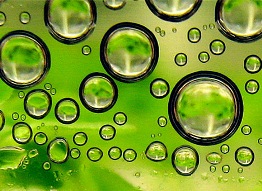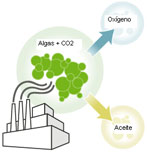Oil from Algae
The algae can be found almost everywhere (oceans, pools, swimming pools...). Although they are not true plants, these unicellular organisms also have the capacity to make the photosynthesis which allows the conversion of solar energy into chemical one. In some species of algae, this chemical energy occurs in oil form which is very similar to common vegetable oils.
The unicellular structure of the algae is extremely efficient in the use of the light and the absorption of nutrients, so much that the growth and the productivity of the algae are between 30 and 100 times superior to crops such as soya.

The production of algae does not compete with agriculture. The facilities of algae production are closed and they do not require land for their growth, they use a 99% less amount of water than conventional agriculture and can be located in lands which are not dedicated to agriculture and located far from water. Since all the organism turns the sun light into oil, the algae can produce more oil in an area as large as a garage than a soya plantation as large as a football pitch.
The species of algae that grow in a natural way under the suitable conditions can produce oils almost up to the theoretical limit. Their small size (less than 30 microns) and their aquatic nature make them ideal for closed systems of large-scale production, highly automated known as photo-reactors. These systems are designed to provide each cell with the necessary and accurate conditions for the highest productivity.


The algae grow perfectly well in the presence of high carbon dioxide concentrations. And nitrogen dioxide, a polluting agent from the electrical power stations, is a nutrient for the algae. The facilities of algae production can therefore be fed with exhaust gas from the electrical power stations that use fossil fuels, to significantly increase the production and clean the air. The carbohydrates that remain after the oil has been extracted from the algae, can be used to elaborate animal feed, ethanol and potentially to seize coal.
